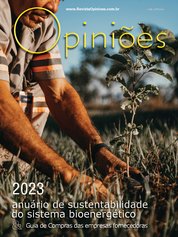Ricardo Hatschbach
Presidente da Necta Gás Natural
AsAA23
O desenvolvimento do biometano precisa ser sustentável
O conceito de sustentabilidade, nos últimos anos, tem evoluído de uma simples palavra da moda para uma necessidade urgente, um chamado global para ações concretas. Em meio a esse cenário, o Brasil, com sua vasta extensão territorial e diversidade biológica, é um líder global em geração de energia predominantemente renovável e o 4º país com matriz energética mais renovável do mundo, conforme o Our World in Data. Por outro lado, o Brasil é o 5º maior emissor de gases do efeito estufa. Nosso protagonismo global depende de como vamos liderar a transição para um futuro cada vez mais sustentável.
Um dos aliados dessa jornada é o biometano – obtido a partir da purificação do biogás – uma fonte de energia renovável com o potencial de contribuir com a rota de descarbonização do país e, em particular, do estado de São Paulo.
Quando analisamos os maiores emissores de Gases do Efeito Estufa – GEE, uma das grandes oportunidades é a descarbonização do transporte, especialmente da frota pesada e do transporte público, que são responsáveis por cerca de 12% das emissões de GEE e consomem cerca de 35% do diesel no Brasil. Em São Paulo, por exemplo, o setor de transportes é responsável por 29% das emissões de GEE do estado, assim a substituição do diesel consumido no estado pelo gás natural convencional ou renovável pode reduzir significativamente suas emissões de carbono, melhorar a qualidade do ar nas cidades e estabelecer um precedente para outros estados.
Além dos benefícios ambientais, o biometano pode apresentar vantagens econômicas, como geração de empregos e aumento da arrecadação de impostos. Tal transformação, contudo, não está isenta de desafios. A produção de biometano exige infraestrutura e tecnologias robustas, além de investimentos significativos.
Nesse sentido, o papel do Estado é estabelecer um ambiente com segurança jurídica e regulatória, sem criar subsídios, custos ou encargos para serem compartilhados entre os consumidores. Por outro lado, o setor privado deve liderar em inovação, investir em tecnologia e capacidade de produção e desenvolver um produto competitivo.
A convergência de interesses do Estado, setor privado e comunidade é crucial. São Paulo, com sua influência, pode ser o catalisador dessa transformação, mostrando o caminho para um Brasil ainda mais limpo e autossuficiente.
No entanto, para criarmos um plano de desenvolvimento sustentável para o biometano, alguns pontos precisam ser observados com atenção:
Um dos aliados dessa jornada é o biometano – obtido a partir da purificação do biogás – uma fonte de energia renovável com o potencial de contribuir com a rota de descarbonização do país e, em particular, do estado de São Paulo.
Quando analisamos os maiores emissores de Gases do Efeito Estufa – GEE, uma das grandes oportunidades é a descarbonização do transporte, especialmente da frota pesada e do transporte público, que são responsáveis por cerca de 12% das emissões de GEE e consomem cerca de 35% do diesel no Brasil. Em São Paulo, por exemplo, o setor de transportes é responsável por 29% das emissões de GEE do estado, assim a substituição do diesel consumido no estado pelo gás natural convencional ou renovável pode reduzir significativamente suas emissões de carbono, melhorar a qualidade do ar nas cidades e estabelecer um precedente para outros estados.
Além dos benefícios ambientais, o biometano pode apresentar vantagens econômicas, como geração de empregos e aumento da arrecadação de impostos. Tal transformação, contudo, não está isenta de desafios. A produção de biometano exige infraestrutura e tecnologias robustas, além de investimentos significativos.
Nesse sentido, o papel do Estado é estabelecer um ambiente com segurança jurídica e regulatória, sem criar subsídios, custos ou encargos para serem compartilhados entre os consumidores. Por outro lado, o setor privado deve liderar em inovação, investir em tecnologia e capacidade de produção e desenvolver um produto competitivo.
A convergência de interesses do Estado, setor privado e comunidade é crucial. São Paulo, com sua influência, pode ser o catalisador dessa transformação, mostrando o caminho para um Brasil ainda mais limpo e autossuficiente.
No entanto, para criarmos um plano de desenvolvimento sustentável para o biometano, alguns pontos precisam ser observados com atenção:
• Comparações internacionais: ao avaliar políticas como o Inflation Reduction Act dos EUA e o Green Deal da União Européia para eventual aplicação no Brasil é essencial considerar as diferenças socioeconômicas, geográficas e culturais. Não se deve assumir que o sucesso em uma região do mundo se traduzirá automaticamente em resultados semelhantes no Brasil, dada a singularidade dos nossos desafios e oportunidades.
• Viabilidade econômica: as plantas de biometano devem ser economicamente viáveis, sem depender do governo estadual ou federal para subsídios. A atratividade da molécula do biometano vai ser ditada pelo mercado, que vai indicar se quer ou não pagar pelo atributo renovável.
• Indexador da molécula: o mercado precisa desenvolver uma estrutura de derivativos/swap para o biometano, atualmente precificado em R$ + IPCA, poder ser competitivo no longo prazo com o gás natural convencional, mais comumente precificado em USD + Brent.
• Segurança de suprimento: os clientes industriais, como vidreiras, ceramistas,
dentre outras, não podem correr o risco de interrupção no suprimento de gás, sendo fundamental compreender e mitigar os impactos da sazonalidade da produção do biometano.
• Desafio da escala: o biometano está mais para a “geração distribuída caipira” do que para o “pré-sal caipira”, em virtude de a oferta ser caracterizada por baixos volumes distribuídos por diversos pontos de produção distintos e não, necessariamente, no mesmo local onde está a demanda.
Por fim, o estado de São Paulo, com sua capacidade e influência, tem a oportunidade de liderar essa agenda de transição energética no Brasil. Para que essa visão se torne realidade, é fundamental que os desafios sejam reconhecidos e abordados proativamente. Essa transformação pode muito bem começar com o zumbido dos motores movidos a gás natural, seja convencional ou biometano, pelas estradas de São Paulo.




